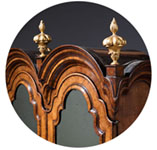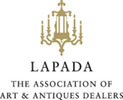Early 18th Century George I Highly Figured Walnut Double Dome Bookcase on Chest
Sold
Request Information
Follow Us
Early 18th Century George I Highly Figured Walnut Double Dome Bookcase on Chest
An exceptional and original highly figured George I walnut double dome bookcase on chest, circa 1720-1730. To the bookcase, original surmounted walnut finials on moulded chimneys sit above well-shaped moulded double dome arches to the front and sides.
The shaped break-arch doors with original hand-bevelled mercury mirror plates sit inside moulded and feather banded frames above candle slides, opening on shaped gilt-brass chased strap hinges to reveal the four-pin lock, shaped gilt brass clasps and four double-D moulded and grained shelves. Raised on two short over three long oak-lined graduating drawers, each double book-matched and framed to each side with fine feather-banding and cross banding.
This technique appears to have originated in the workshops running down the Southside of St Pauls Churchyard in the first quarter of the 18th century, which housed some of the most renowned cabinet makers of the time. It should be noted that pieces such as this are rare; rarer still, in original condition, with all original features, to include: chased brass furniture, feet, finials, shelves, mirror plates and possibly most crucially untouched patinated surfaces.
Condition
Good
In original condition, with all original features, to include chased brass furniture, feet, finials, shelves, mirror plates and possibly most crucially untouched patinated surfaces. Conserved. Wear consistent with age and use.
Dimensions
Width: 41.34 in. (105 cm)
Depth: 22.05 in. (56 cm)
PREVIOUSLY SOLD
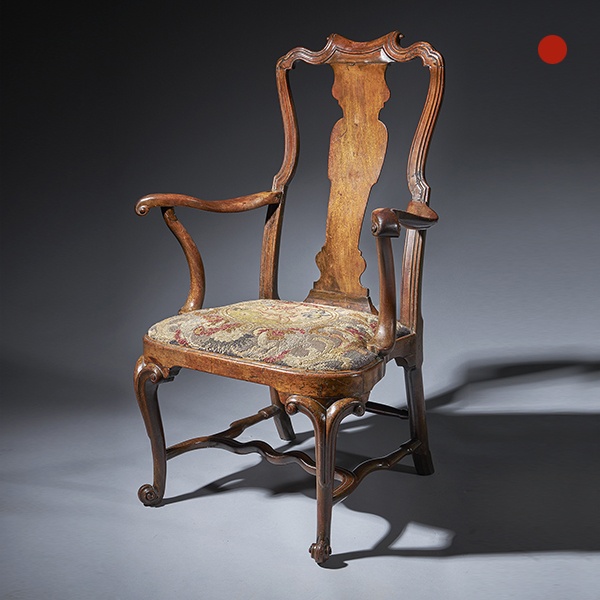
An extraordinary George I walnut armchair Circa 1725, England
An extraordinary George I walnut armchair of fabulous colour, form and patination. The chair is of the most lively shapes being either carved or turned.
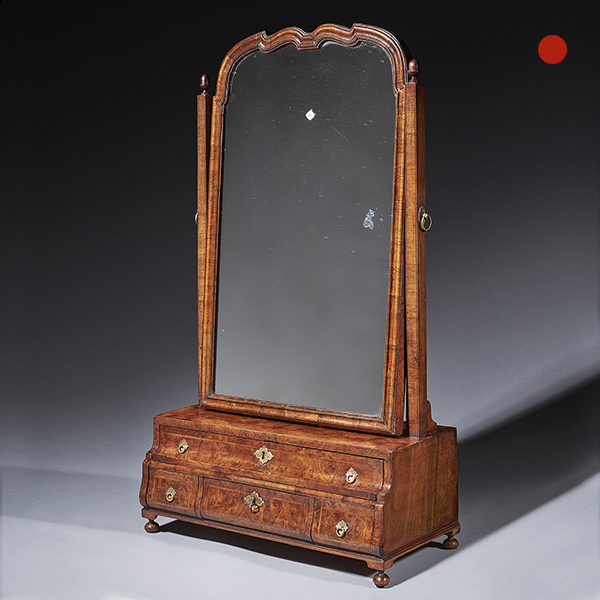
A fine burr walnut George I dressing mirror. Circa 1715-25 England.
A fine burr walnut George I dressing mirror Circa 1715-25 England. SoldFollow UsA fine burr walnut George I antique dressing mirror An extremely rare and fine George I burr walnut dressing mirror raised on ball and bracket feet. The drawer...
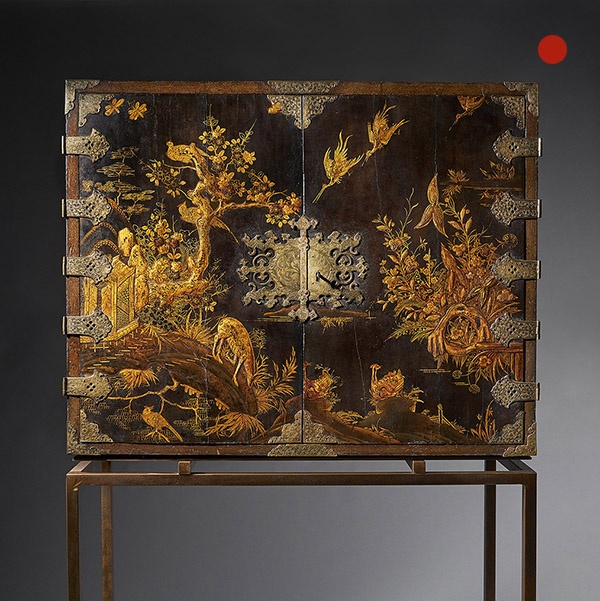
Charles II Japanned Cabinet of exceptional condition c. 1675 raised on a contemporary stand.
Charles II Japanned Cabinet of exceptional condition c. 1675 raised on a contemporary stand SOLD Follow UsCharles II Japanned Cabinet of exceptional condition c. 1675 raised on a contemporary stand An English Charles II Japanned cabinet of...
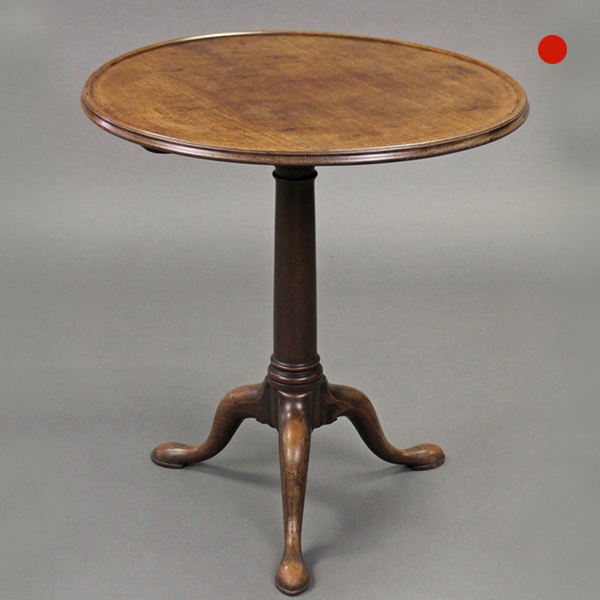
George III Mahogany Gun Barrel Tray Top Tripod Table Sofa Table Chippendale Period
A George III Mahogany Gun Barrel Tray Top Tripod Table, Sofa Table, Chippendale Period, circa 1770-1790, England. The circular tray top with moulded edge is raised on a gun-barrel centre column and cabriole legs with shaped pad feet.
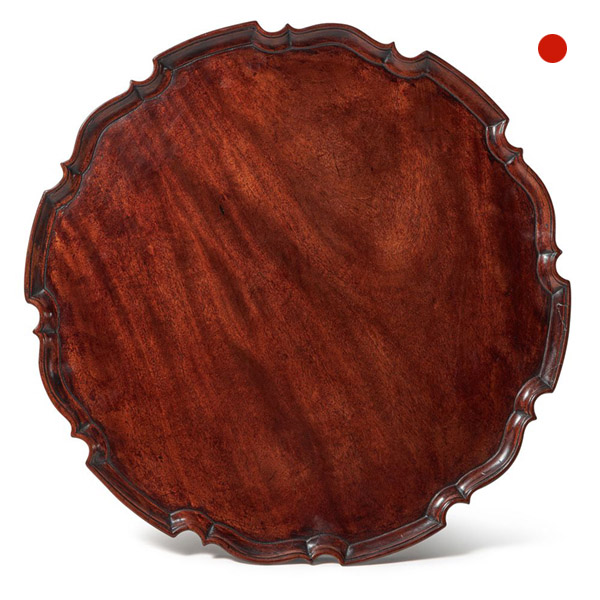
George III Chippendale Period Mahogany Pie Crust Tray
A fine George III Chippendale period mahogany pie crust tray, circa 1770, England. Of circular form, with a carved and shaped edge. Alexander George Fine Antique sell 18th & 19th century antique English furniture.
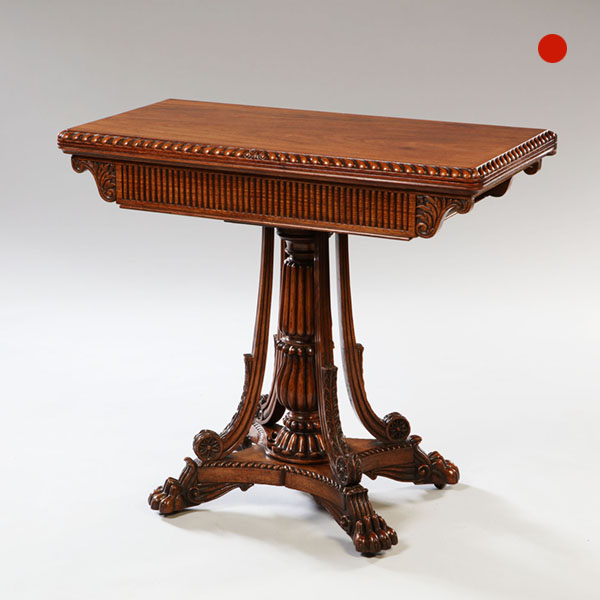
Solid Padauk Carved Anglo-Indian Card Table
Solid Padauk Carved Anglo-Indian Card Table. With the growth of trade and military power, the East India Company encouraged its British male employees to create a community with mixed ancestry. The company paid 15 silver rupees to the mother of any child born of such marriages.

An extraordinary George I walnut armchair Circa 1725, England
An extraordinary George I walnut armchair of fabulous colour, form and patination. The chair is of the most lively shapes being either carved or turned.

A fine burr walnut George I dressing mirror. Circa 1715-25 England.
A fine burr walnut George I dressing mirror Circa 1715-25 England. SoldFollow UsA fine burr walnut George I antique dressing mirror An extremely rare and fine George I burr walnut dressing mirror raised on ball and bracket feet. The drawer...

Charles II Japanned Cabinet of exceptional condition c. 1675 raised on a contemporary stand.
Charles II Japanned Cabinet of exceptional condition c. 1675 raised on a contemporary stand SOLD Follow UsCharles II Japanned Cabinet of exceptional condition c. 1675 raised on a contemporary stand An English Charles II Japanned cabinet of...

George III Mahogany Gun Barrel Tray Top Tripod Table Sofa Table Chippendale Period
A George III Mahogany Gun Barrel Tray Top Tripod Table, Sofa Table, Chippendale Period, circa 1770-1790, England. The circular tray top with moulded edge is raised on a gun-barrel centre column and cabriole legs with shaped pad feet.

George III Chippendale Period Mahogany Pie Crust Tray
A fine George III Chippendale period mahogany pie crust tray, circa 1770, England. Of circular form, with a carved and shaped edge. Alexander George Fine Antique sell 18th & 19th century antique English furniture.

Solid Padauk Carved Anglo-Indian Card Table
Solid Padauk Carved Anglo-Indian Card Table. With the growth of trade and military power, the East India Company encouraged its British male employees to create a community with mixed ancestry. The company paid 15 silver rupees to the mother of any child born of such marriages.
YOU MAY ALSO LIKE
No Results Found
The page you requested could not be found. Try refining your search, or use the navigation above to locate the post.
No Results Found
The page you requested could not be found. Try refining your search, or use the navigation above to locate the post.
